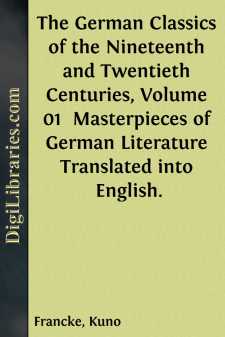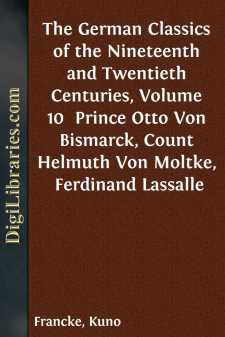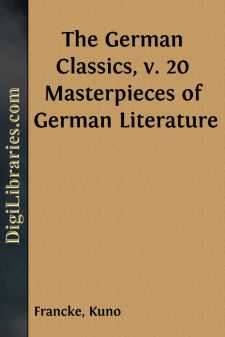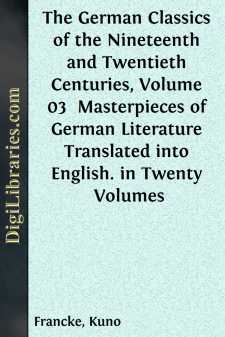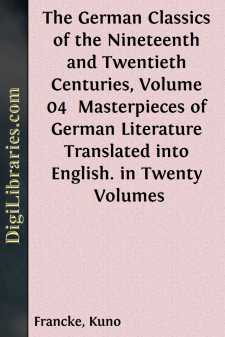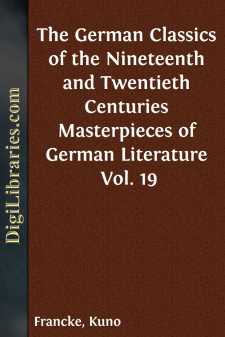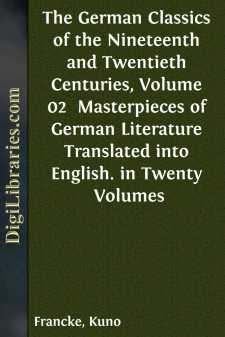Categories
- Antiques & Collectibles 13
- Architecture 36
- Art 48
- Bibles 22
- Biography & Autobiography 813
- Body, Mind & Spirit 142
- Business & Economics 28
- Children's Books 16
- Children's Fiction 13
- Computers 4
- Cooking 94
- Crafts & Hobbies 4
- Drama 346
- Education 46
- Family & Relationships 57
- Fiction 11829
- Games 19
- Gardening 17
- Health & Fitness 34
- History 1377
- House & Home 1
- Humor 147
- Juvenile Fiction 1873
- Juvenile Nonfiction 202
- Language Arts & Disciplines 88
- Law 16
- Literary Collections 686
- Literary Criticism 179
- Mathematics 13
- Medical 41
- Music 40
- Nature 179
- Non-Classifiable 1768
- Performing Arts 7
- Periodicals 1453
- Philosophy 64
- Photography 2
- Poetry 896
- Political Science 203
- Psychology 42
- Reference 154
- Religion 513
- Science 126
- Self-Help 84
- Social Science 81
- Sports & Recreation 34
- Study Aids 3
- Technology & Engineering 59
- Transportation 23
- Travel 463
- True Crime 29
The German Classics of the Nineteenth and Twentieth Centuries, Volume 01 Masterpieces of German Literature Translated into English.
by: Kuno Francke
Categories:
Description:
Excerpt
THE LIFE OF GOETHE
BY CALVIN THOMAS, LL.D.
Professor of Germanic Languages and Literatures, Columbia University
Goethe, the illustrious poet-sage whom Matthew Arnold called the "clearest, largest, and most helpful thinker of modern times," was born August 28, 1749, at Frankfurt on the Main.[2] He was christened Johann Wolfgang. In his early years his familiar name was Wolfgang, or simply Wolf, never Johann. His family was of the middle class, the aristocratic von which sometimes appears in his name, in accordance with German custom, having come to him with a patent of nobility which he received in the year 1782.
Johann Caspar Goethe, the poet's father, was the son of a prosperous tailor, who was also a tailor's son. Having abundant means and being of an ambitious turn, Johann Caspar prepared himself for the profession of law, spent some time in Italy, and then settled in Frankfurt in the hope of rising to distinction in the public service. Disappointed in this hope, he procured the imperial title of Councilor, which gave him a dignified social status but nothing in particular to do. He thus became virtually a gentleman of leisure, since his law practise was quite insignificant. In 1748 he married Katharina Elisabeth Textor, whose father, Johann Wolfgang Textor, was the town's chief magistrate and most eminent citizen. She was eighteen years old at the time of her marriage—twenty years younger than her husband—and well fitted to become a poet's mother. The gift on which she especially prided herself was her story-telling. Wolfgang was the first child of these parents.
The paternal strain in Goethe's blood made for level-headedness, precise and methodical ways, a serious view of life, and a desire to make the most of it. By his mother he was a poet who liked nothing else so well as to invent dream-worlds and commune with the spirits of his imagination. He also ascribes to his mother his Frohnatur, his joyous nature. And certain it is that his temperament was on the whole sunny. As he grew to manhood men and women alike were charmed by him. He became a virtuoso in love and had a genius for friendship. But he was not always cheerful. In his youth, particularly, he was often moody and given to brooding over indefinable woes. He suffered acutely at times from what is now called the melancholia of adolescence. This was a phase of that emotional sensitiveness and nervous instability which are nearly always a part of the poet's dower.
Wolfgang grew up in a wholesome atmosphere of comfort and refinement. He never knew the tonic bitterness of poverty. On the other hand, he was never spoiled by his advantages; to his dying day he disliked luxury. At home under private tutors the boy studied Latin, French, and English, and picked up a little Italian by overhearing his sister's lessons. In 1758 Frankfurt was occupied by a French army, and a French playhouse was set going for the diversion of the officers. In the interest of his French Wolfgang was allowed to go to the theatre, and he made such rapid progress that he was soon studying the dramatic unities as expounded by Corneille and actually trying to write a French play....


